
The Muscogee, also known as the Mvskoke, Muscogee Creek or just Creek, and the Muscogee Creek Confederacy, are a group of related Indigenous peoples of the Southeastern Woodlands in the United States. Their historical homelands are in what now comprises southern Tennessee, much of Alabama, western Georgia and parts of northern Florida.

Wilkes County is a county located in the east central portion of the U.S. state of Georgia. As of the 2020 census, the population was 9,565. The county seat is the city of Washington.

Bluffton is a town in Clay County, Georgia, United States. As of the 2020 census, the city had a population of 113.
James Gunn was a delegate to the Continental Congress and a United States Senator from Georgia.

The Yazoo land scandal, Yazoo fraud, Yazoo land fraud, or Yazoo land controversy was a massive real-estate fraud perpetrated, in the mid-1790s, by Georgia governor George Mathews and the Georgia General Assembly. Georgia politicians sold large tracts of territory in the Yazoo lands, in what are now portionspresent-day states Alabama and Mississippi, to political insiders at very low prices in 1794. Although the law enabling the sales was overturned by reformers the following year, its ability to do so was challenged in the courts, eventually reaching the US Supreme Court. In the landmark decision in Fletcher v. Peck (1810), the Court ruled that the contracts were binding and the state could not retroactively invalidate the earlier land sales. It was one of the first times the Supreme Court had overturned a state law, and it justified many claims for those lands. Some of the land sold by the state in 1794 had been shortly thereafter resold to innocent third parties, greatly complicating the litigation. In 1802, because of the ongoing controversy, Georgia ceded all of its claims to lands west of its modern border to the U.S. government. In exchange the government paid cash and assumed the legal liabilities. Claims involving the land purchases were not fully resolved until legislation was passed in 1814 establishing a claims-resolution fund.
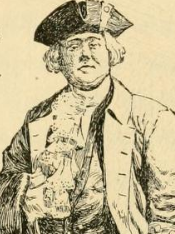
George Mathews was an American soldier and politician from the U.S. States of Virginia and Georgia. He was a brevet brigadier general in the Continental Army, the 20th and 24th Governor of Georgia, a U.S. Representative from Georgia, and the leading participant in the Patriot War of East Florida.

Alexander McGillivray, also known as Hoboi-Hili-Miko, was a Muscogee (Creek) leader. The son of a Muscogee mother and a Scottish father, he was literate and educated, and understood the "white" European world and merchandise trading well. These gave him prestige, especially with European Americans, who were glad to finally find a Creek leader they could talk to and deal with. He used his role as link between the two worlds to his advantage, not always fairly, and became the richest Creek of his time.

John Milledge was an American politician. He fought in the American Revolution and later served as United States Representative, 26th Governor of Georgia, and United States Senator. Milledge was a founder of Athens, Georgia, and the University of Georgia. From January to May 1809, Milledge served briefly as President pro tempore of the United States Senate.

George McIntosh Troup was an American politician from the U.S. state of Georgia. He served in the Georgia General Assembly, U.S. House of Representatives, and U.S. Senate before becoming the 32nd Governor of Georgia for two terms and then returning to the U.S. Senate. A believer in expansionist Manifest Destiny policies and a supporter of native Indian removal, Troup was born to planters and supported slavery throughout his career. Later in his life, he was known as "the Hercules of states' rights."
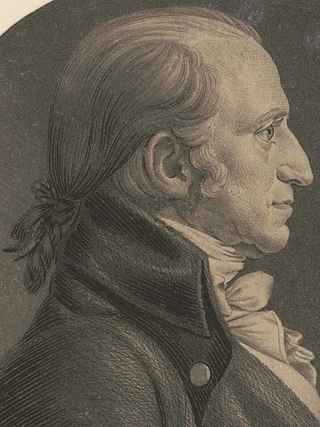
James Jackson was an early British-born Georgia politician of the Democratic-Republican Party. He was a member of the U.S. House of Representatives from 1789 until 1791. He was also a U.S. Senator from Georgia from 1793 to 1795, and from 1801 until his death in 1806. In 1797 he was elected 23rd Governor of Georgia, serving from 1798 to 1801 before returning to the senate.
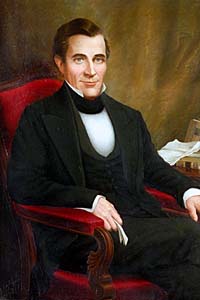
Jared Irwin served twice as elected Governor of Georgia (1796–1798) and (1806–1809). He first was elected to office as a reformer based on public outrage about the Yazoo land scandal. He signed a bill that nullified the Yazoo Act, which had authorized the land sales. Challenges to land claims purchased under the former act led to the United States Supreme Court's hearing the case Fletcher v. Peck (1810). In a landmark decision, the Court upheld the land contracts, and ruled that the state law was unconstitutional in trying to nullify valid contracts.
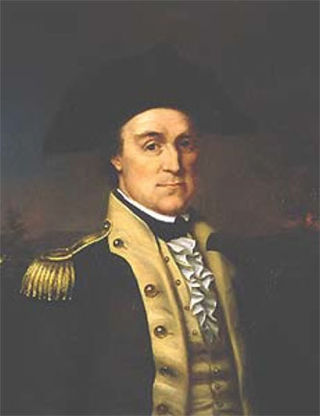
Elijah Clarke was an American military officer and Georgia legislator.
General John Twiggs served as a leader in the Georgia Militia during the American Revolutionary War. Twiggs County, Georgia was named after him.
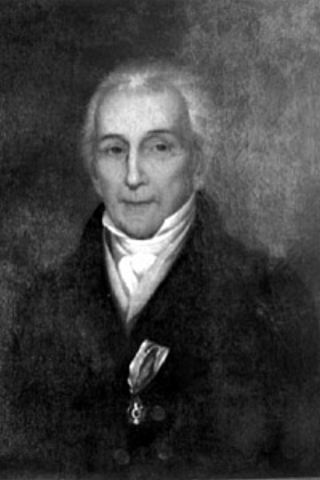
John Wereat was an American politician and the Governor of Georgia.

The Cherokee–American wars, also known as the Chickamauga Wars, were a series of raids, campaigns, ambushes, minor skirmishes, and several full-scale frontier battles in the Old Southwest from 1776 to 1794 between the Cherokee and American settlers on the frontier. Most of the events took place in the Upper South region. While the fighting stretched across the entire period, there were extended periods with little or no action.
The Oconee War was a military conflict in the 1780s and 1790s between European Colonists and the Creek Indians known as the Oconee, who lived in an area between the Apalachee and North Oconee rivers in the state of Georgia.
The Cherokee have participated in over forty treaties in the past three hundred years.
The Chickamauga Cherokee were a Native American group that separated from the greater body of the Cherokee during the American Revolutionary War and up to the early 1800s.
The Treaty of Dewitts Corner ended the initial Overhill Cherokee targeted attacks on colonial settlements that took place at the beginning of the American Revolution. A peace document signed by the Cherokee and South Carolina, the treaty instead laid the foundation for the decades long Cherokee–American wars fought between the European-Americans and the Chickamauga Cherokee people.
Bourbon County, Georgia was a county of the U.S. state of Georgia from 1785 to 1788. The county was created by Georgia in 1785 as part of the Yazoo land scandal out of disputed Yazoo lands in present-day Mississippi and was dissolved in 1788 due to pressure from the federal government.












